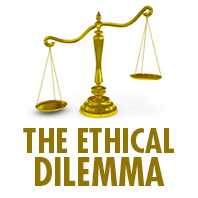The Ethical Dilemma: Weekend at Bernie

Experiencing an ethical dilemma? Need advice from a humanist perspective? In the spirit of The New York Times’ ‘The Ethicist’ or Slate’s ‘Dear Prudence,’ Humanist Network News is proud to introduce “The Ethical Dilemma,” an advice column by Joan Reisman-Brill.
Send your questions to The Ethical Dilemma at hnn@americanhumanist.org. All inquiries are kept confidential.
Too Late for Drop-Dead Date: A few months ago my mother-in-law got an invitation to the wedding of her cousin Bernie’s son. She scarcely knows anyone in that branch of the family besides Bernie, but she heard Bernie was dying and wanted to see him one last time. Since she’s in her 80’s and can barely walk, and the wedding was in icy, snowy Canada in January, my husband and I agreed to accompany her. To ensure quality time, we arranged to arrive a few days before the wedding and stay a couple days afterwards.
When we got there, we learned that Bernie had died a month ago—before we’d even booked our airlines or hotels. The family said they expected we wouldn’t come if we knew the news, so they didn’t tell us. We took the first flight home immediately after the wedding. Was the family’s behavior as disgraceful as we think?
—Our Weekend at Bernie’s
Dear Weekend,
I really can’t imagine why these relatives wanted you at the wedding enough to intentionally deceive you. Are you celebrities or something? Was the attendance so sparse they needed warm bodies to meet the caterer’s minimum? Their news blackout also prevented you from going to Bernie’s funeral, which you might have wanted to attend.
But when you judge what the relatives did (or didn’t do), consider this: When a person is dying, there’s no way to know how long he’ll survive, no matter how much he may want to hang on for a special occasion. In the future, if you want to see someone who’s on his deathbed, don’t wait for an engraved invitation and a date months in the future. Get up and go. If you’d visited Bernie when you first heard he was desperately ill, you could have helped him enjoy his last days, without the distraction of the nuptials and all the other guests, and you even would have had the side benefit of milder weather. Then you could have graciously declined the wedding invitation, with your best wishes and a nice gift.
Perhaps Bernie’s survivors considered your strategy to tack your last respects onto the wedding—knowing that you didn’t consider either the wedding or Bernie alone worth the trip—just as tacky as you consider their silence.
Tag, You’re It!: An acquaintance is always dressed to kill in the latest, most exclusive brand-name fashions. I believe my husband and I have a higher income than her husband (she doesn’t work), but we couldn’t/wouldn’t spend it on such extravagant stuff, and I always wondered how she could. On several occasions I noticed price tags still on what she was wearing, and I figured she either was unaware or wanted people to see the brand names and ridiculous amounts she spent. One time when I could no longer tolerate a dangling tag, I made a move to remove it for her. She screamed for me to stop, and explained that she wears the items for a season, then returns them to the shop and gets new things. She also begged me not to tell her husband—the man who makes fun of my husband’s bargain swim trunks and himself wears unbelievably pricey ones (which I’m sure he can’t exchange once they’ve gotten wet and sandy). I am appalled. Isn’t this theft or fraud or some other crime? What should I do? By the way, this couple is very religious.
—Losing My Breakfast at Tiffany’s
Dear Tiffany,
Guess they haven’t come across any commandment explicitly against this. While the lady’s behavior—if not her clothing—is truly shabby, it’s really between her and where she shops (or shoplifts). Salespeople can usually tell when a garment has been out on the town, passed the return date, or slipped out without a stop at the cash register. They have the option to refuse to refund or exchange, ban her from the store, or call the cops. So if they are playing along with this woman, they must have their reasons. Maybe it’s akin to lending designer fashions to red carpet celebrities—they may hope she’ll attract actual paying customers who figure, “If she can afford it, so can I.”
Surely her husband, himself a fashionista, is aware of what these things cost and how much she spends–or in her case, doesn’t spend. So either he’s turning a blind eye or is proud of his wife’s” thrifty” habits. Maybe she just doesn’t want him to know that you know.
This pair is very focused on how they appear, but you’re probably not the only one who’s noticed the telltale tags. There may be a good deal of tittering going on behind the glamour couple’s back among those who, like you, see through their glad rags to the sad sacks beneath. If you decide to say anything, it might be to suggest shopaholic therapy.
Joan Reisman-Brill is a writer based in New York City. She received her BA in English literature from the University of Chicago, an MA also in English lit from the University of Michigan, and an MBA in management and marketing from New York University. She has worked in public relations, marketing and myriad facets of writing and editing for nearly four decades. She has been steadily increasingly her humanist identification and activism at an accelerating rate, and while she doesn’t pretend to have all the answers, she welcomes this opportunity to tackle the questions.
